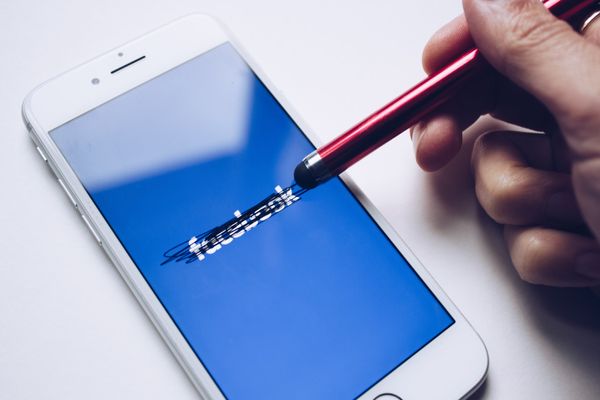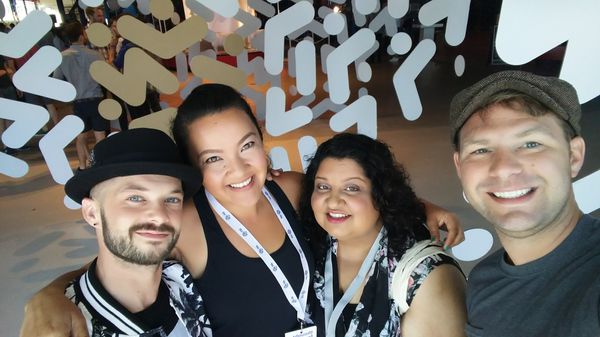
Most people don’t realize their own power, and at Ridiculously Efficient, we see your personal brand as a visual way to express and access your inner power. What even fewer people realize is that an effective personal branding strategy can also solve problems and remove obstacles.
My best friend, Billy Murray, is also a trusted showmanship coach, and knows better than anyone the power of a good brand. He’s been part of two, as a clown with Ringling Bros. Barnum & Bailey, and as a character trainer with The Walt Disney Company. I asked him to riff a little on some of the biggest problems he’s seen good branding solve, and we’ve compiled the top five below.
So now, on to the big problems that effective personal branding solves.
1. Lackluster First Impression
Let’s be honest. People are judgmental, and we are people. It only takes people a moment to decide whether you are legit and they are going to invest resources (time, energy, money) into your personal brand.
Billy's Take: Not too long along, I was interviewing candidates for a leadership position. I had an applicant with an impressive resume who I was hoping to hire if he had a strong interview. He walked into office with a big smile and shook my hand, but I was immediately turned off because his button-up shirt was a wrinkled mess!
The position for which he was applying has a very strict dress code, and we take professional appearance very seriously. I ended up bringing the guy on, but I had to have an uncomfortable “step up the outfit” talk, which is never fun.
Marissa's Take: I also have an interview story for this one. A prospective editorial intern was coming in for an in-person interview with me. The night before, he sent me an email asking about the internship’s dress code, saying that he’d spent much of that year growing what he called a “luscious mustache,” and while he was happy to shave it off for the interview and this opportunity, he wanted to be certain that was actually a requirement before doing so. Because the internship would be out of my remote office, I told him not to worry about it and that I’d see him -- and his luscious mustache -- at the interview.
It sounds silly, but this little gesture made him stand out from the other applicants I was interviewing. Sure, some will criticize the college kid for asking about the dress code rather than assuming or researching it, but that’s a wasted effort. Instead, I praised him for being memorable -- and later awarded him the internship.
2. Lost a Winnable Deal
You had that awesome contract or agreement locked down, but then it slipped right from under your fingers. Those with an unstoppable personal brand land the deal and keep it grounded. Don’t let something silly make you lose something great.
Billy's Take: I remember back when I was in a Winter Quarters with Ringling Bros. and we were up to our eyeballs in “show build” mode. Piece by piece, the show was coming together, and each performer was suggesting special talents. One of my buddies in the act pitched that he could do a "full-twisting inverted karate kick," and naturally the group was impressed and wanted to see. Even though it turns out that he could legitimately do the skill, when we asked him to show us, he said he "didn’t feel like it," so no one believed him. He missed out on what ended up being a featured spot in the show. It’s cool though -- I got it. :)
Marissa's Take: Here’s another interview story. A few years ago, I had an intern who was talented and capable, but wasn’t going to get a full-time offer after the internship ended. Thinking I would give her the benefit of the truth and a little advanced notice, I held a meeting wherein I told her two things: that we loved her work but weren’t going to give her a job offer, and that in addition to our standard written recommendation, I’d also make a few personal introductions to key people in my network. All internship long, this girl was rock-solid, with a great attitude, so it was easy to genuinely recommend her to others.
One entrepreneur I contacted scheduled an interview with her. An ideal result -- until a week or so later, when I got a brief email recounting his bizarre experience with my former intern. She’d rescheduled the initial interview, then absolutely ‘phoned in’ the rescheduled call with an emotionless tone, one-sentence responses to open-ended questions, and an overall lackluster attitude. I’ll never know what got into her, but I do know this: her personal brand wasn’t consistent from one interaction to another, and it cost her at least one great job.
3. Unpredictable Outcome
If the results you deliver and others' perception of your brand are aligned, your credibility leapfrogs. But if your results and brand perception are off, you lose credibility, trust, rapport, respect and any hope for long-term relationships.
Billy's Take: I recently worked for a nonprofit organization that unfortunately went under. We were in a partnership with a trusted Southern California hospital that has a phenomenal reputation for being the best of best. When the nonprofit got media coverage for its severe financial troubles, the hospital cut ties to protect their brand.
Although this was a hit to me personally, the hospital’s reputation is its brand. Would families equate the hospital’s ability to deliver results -- in this case, by providing good care for their children -- with the nonprofit partner’s failing business strategy? If the hospital hadn’t eliminated the suffering nonprofit from the equation, its brand and credibility would have been in question, even if only for its poor choice in partners.
Marissa's Take: One of my favorite weeks of the year happens when the entrepreneurs’ mastermind I organize holds our annual event, and it’s partially because I get to stay at the Four Seasons. If you’ve ever stayed at or spent any time in a Four Seasons, you’ll see luxury, quality and care in every inch, from every angle and during every experience.
While traveling in New Orleans earlier this year, my Uber driver revealed that he had worked at the Four Seasons for nearly a decade. During our conversation, he explained that the hotel empowers their employees to take actions they believe are in the guest’s best interest -- even if that means it costs the company money. So if a guest approaches the front desk with a problem, a Four Seasons employee would have the authority to do something within his or her discretion to improve the experience (e.g. room upgrade, bottle of wine to the room), all without checking with a manager.
4. Market Confusion / Irrelevance
If people can’t mentally associate your brand with something they need or want, they won’t remember you when you need them most. Consider how brands have changed the meaning of these phrases:
- Can you hand me a bandage? = Can you hand me a Band-Aid?
- Let me conduct an online search = Let me Google that
Billy's Take: I have have had the privilege to work for Disney for the past five years. People save up for years to visit one of their world-renowned theme parks for as short as one day. And during that trip, people will spend buckets of money, because they mentally associate the brand with endless uplifting emotions and memories of their childhood, family vacations and experiences with their favorite characters. This brand is all about owning trusted family entertainment, and they continue to raise the bar and provide unforgettable experiences to their guests.
Think back to those commercials in the 90’s where, after the Super Bowl or the World Series, reporters asked sports stars what they were going to do next, and they responded, “I’m going to Disneyland!” It’s every company’s dream to have such powerful brand recognition that, when people have all of the money in the world at their disposal, they still want to blow it all at their theme park.
Marissa's Take: Amazon has done a great job at embodying the “Everything Store” brand, as far as my household is concerned. We rarely do any brick-and-mortar shopping -- unless it’s to try something on that we’ll buy online later -- and instead head straight to Amazon when we need almost anything.
Of course, Ridiculously Efficient was named with this criteria in mind. In 2010, I was looking for a way to brand my freelance editorial services, which I delivered at high volume. It never used to feel substantial enough when I described myself as efficient or even effective -- but the moment I introduced my company as Ridiculously Efficient, I didn’t have to look for clients anymore, because people suddenly wanted to work with me. (A side bonus: because Ridiculously Efficient describes an ideal state, rather than a concrete thing, it’s been easy to pivot our service offerings without renaming the company.)
5. No Expectations for the Relationship
Your look and brand set the tone for how people should expect their interactions with you to go. If your appearance and communication style convey professionalism and expertise, you’ll pass for an expert until the first time you need to create results. If you’re selling elite services at elite prices, but hand out a wimpy business card, you expose yourself as a fake, and your luxury buyers will run the other way.
Billy's Take: A long, long time ago, when I used to get haircuts, I went to a barber on Melrose here in Los Angeles. The barber shop had collages of rockstar posters on the walls, loud music blasting in the background, and all of the barbers looked like they stepped right out of one of the posters from the wall.
The reason I liked this barber shop so much is that they were one of the only places near me that had walk-in services available, which always worked out great with my busy schedule. However, I immediately wanted to jump out of my chair and get the F out of there when I was approached by a barber who didn’t seem to fit in. His style of clothing, or his lack of style, did not match his coworkers or that of the brand. He also had a terrible haircut, which also made me feel uneasy. Why should I trust someone to make me look good who does not put the effort in to make themselves look good?
Marissa's Take: A great place to see this in action is at a big auto show -- for example, the Los Angeles Auto Show. The car business is all about branding, so it's a great place to study up on the subtle and not-so-subtle messages automakers convey with their exhibits and overall staging.
In particular, I'll never forget the Cadillac business cards, or the Porsche promotional books. As a kid, those were the epitome of luxury. The Cadillac business cards were textured -- almost rubberlike -- and substantially thicker than any of the other cards I collected that day. And the Porsche promotional books were hardcover, rather than printed, stapled sheets. Texture matters. Quality matters. Showmanship matters.
Closing Words
We all project our personal brand onto the world. But are you doing so effectively and strategically?









Member discussion